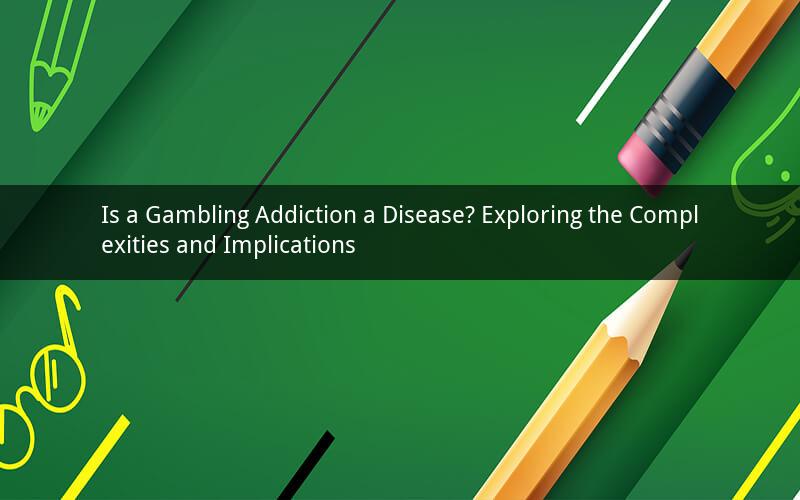
Introduction:
Gambling addiction, also known as pathological gambling, has long been a topic of debate among researchers, clinicians, and the general public. One of the central questions revolves around whether gambling addiction should be classified as a disease. This article delves into the complexities surrounding this issue, examining the arguments for and against categorizing gambling addiction as a disease.
I. Understanding Gambling Addiction
Gambling addiction is characterized by the inability to control or stop gambling despite negative consequences. It often leads to significant personal, financial, and social problems. While the exact cause of gambling addiction is not fully understood, several factors contribute to its development, including genetic predisposition, environmental influences, and psychological factors.
II. The Disease Model of Gambling Addiction
Proponents of the disease model argue that gambling addiction should be classified as a mental disorder. They contend that it shares several similarities with other recognized mental illnesses, such as alcoholism and drug addiction. Here are some key points supporting this perspective:
A. Genetic and Neurobiological Evidence:
Research suggests that genetic factors play a significant role in the development of gambling addiction. Additionally, studies have identified specific brain areas and neurotransmitter systems involved in the disease process.
B. Similarities with Other Addictions:
Gambling addiction shares common characteristics with other addictive disorders, such as a compulsive urge to gamble, tolerance, withdrawal symptoms, and the potential for relapse. These similarities support the notion that gambling addiction is a disease.
C. Prevalence and Impact:
Gambling addiction affects millions of individuals worldwide, causing considerable distress and harm. Recognizing it as a disease can lead to increased awareness, early detection, and effective treatment interventions.
III. The Behavior Model of Gambling Addiction
Opponents of the disease model argue that gambling addiction is a behavior disorder rather than a disease. They emphasize the role of personal responsibility and the importance of addressing underlying issues that contribute to the addiction. Here are some points supporting this perspective:
A. Voluntary Nature of Gambling:
Gambling is a voluntary activity, and individuals have the choice to engage in it or not. Thus, opponents argue that personal responsibility should be emphasized rather than attributing addiction to a disease.
B. Treatment Approaches:
Behavioral interventions, such as cognitive-behavioral therapy (CBT), have proven effective in treating gambling addiction. These approaches focus on changing harmful behaviors and beliefs rather than treating a disease.
C. Societal and Cultural Factors:
Opponents argue that societal and cultural factors, such as advertising, accessibility, and economic hardship, contribute to the development of gambling addiction. Addressing these factors is crucial in preventing and treating the disorder.
IV. The Interplay Between Models
While the disease model and the behavior model offer contrasting perspectives on gambling addiction, it is essential to recognize that they are not mutually exclusive. Both models can provide valuable insights into the disorder and contribute to effective treatment strategies.
V. Implications of Recognizing Gambling Addiction as a Disease
If gambling addiction is recognized as a disease, several implications can be expected:
A. Increased Awareness and Stigma Reduction:
By acknowledging gambling addiction as a disease, there is a greater chance of reducing the stigma associated with the disorder. This can lead to increased public awareness and a more compassionate approach towards individuals struggling with addiction.
B. Improved Access to Treatment:
Recognizing gambling addiction as a disease can facilitate better access to treatment services, including mental health care, addiction counseling, and support groups.
C. Research and Policy Development:
A disease perspective on gambling addiction can stimulate further research into the disorder's etiology, treatment approaches, and prevention strategies. This can inform the development of effective policies and interventions.
V. Conclusion
The classification of gambling addiction as a disease is a complex issue with significant implications. While both the disease model and the behavior model offer valuable insights, a comprehensive understanding of gambling addiction requires considering the interplay between these perspectives. By recognizing gambling addiction as a disease, we can work towards reducing stigma, improving access to treatment, and developing effective prevention strategies.
Questions and Answers:
1. Q: What are the primary genetic factors associated with gambling addiction?
A: Research suggests that certain genetic markers, such as variations in genes related to dopamine neurotransmission and impulsivity, may be associated with an increased risk of gambling addiction.
2. Q: How does cognitive-behavioral therapy (CBT) help in treating gambling addiction?
A: CBT helps individuals identify and change harmful thoughts and behaviors associated with gambling addiction. It focuses on developing coping skills, problem-solving techniques, and self-regulation strategies.
3. Q: What role does societal and cultural factors play in the development of gambling addiction?
A: Societal and cultural factors, such as advertising, accessibility of gambling venues, and economic hardship, can contribute to the development of gambling addiction. These factors can create an environment that promotes risky gambling behaviors.
4. Q: How can recognizing gambling addiction as a disease help in reducing stigma?
A: Recognizing gambling addiction as a disease can help reduce stigma by emphasizing that it is a treatable condition with underlying causes, rather than a personal flaw or weakness.
5. Q: What are some effective prevention strategies for gambling addiction?
A: Effective prevention strategies include promoting responsible gambling practices, implementing gambling regulations, providing education on the risks of gambling, and offering support and resources for individuals at risk of developing gambling addiction.